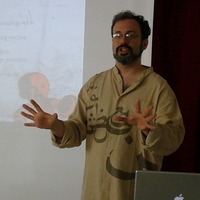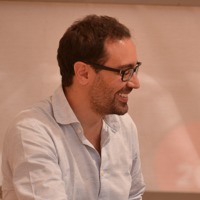More Examples, Less Theory Chapter 5, (Cambridge University Press, 2019
, 2019). Because this is an uncorrected draft, please do not quote. Chapter five draft Lacan: an ... more , 2019). Because this is an uncorrected draft, please do not quote. Chapter five draft Lacan: an ego in pursuit of the ego The tone and purpose of this chapter are different from those that have come before and those that will come after. Up until now, I have been discussing writers of the mind whose works have given me pleasure. I have derived great enjoyment from reading Shaftesbury, Tucker, Freud, James, and even Locke. Even when I have disagreed with their arguments, I have learned much from them. Being suspicious of what Freud said about himself was itself a tribute to the power of his arguments and the grace of writing. I would thoroughly recommend others to read him closely. I have always found that just at the moment when Freud's arguments appear to be becoming a bit silly, then he will suddenly hit the reader with a profound piece of wisdom. The procession of the admired will be resumed after this chapter. Later I will be writing about my teacher, Henri Tajfel, to whom I owe so much, both intellectually and personally. I will be building up to a finale with Marie Jahoda, whose writing, politics and views on the academic world I wish to hold up as an example. This chapter is different: it is not part of the procession. It is more like a tax that has to be paid for all the pleasures that have been gained elsewhere. Others have found considerable pleasure in the writings of Jacques Lacan, but personally I have not. My good friend, the late John Shotter, a deeply intellectual scholar of the mind, used to refer to those whom he was drawn to read as his 'textual friends' (Shotter, 1993, p. 232). He would carry around with him, either in his head or stored on an electronic device, quotations from his textual friends, particularly Wittgenstein and Bakhtin, so that he was never separated from their words. Lacan was never Shotter's textual friend, nor was he mine.











Uploads
Books by Michael Billig
“This excellent book allows insight in to the intricate symbolic struggles for hegemonic identity narratives in the Portuguese society, into what is said, but more importantly, what remains unsaid and why. A must-read for scholars and students trying to understand the impact of the politics of the past on present and future social developments.” – Ruth Wodak, FAcSS, Emerita and Distinguished Professor and Chair in Discourse Studies, Lancaster University, UK,
“Michael Billig's and Cristina Marinho's meticulously researched and highly engaging study of the parliamentary commemorations of the Portuguese Revolution demonstrates why it is important to pay close attention to what politicians say, and, more importantly, what they do not say when they remember the national past. Behind what might, at first sight, seem like the formalities of commemorative language and practices – the modes of address, patterns of applause, symbolic gestures like the wearing of carnations, and so on - Billig and Marinho uncover the murky world of partisan politics, and use it to provide a fascinating and original insight into the art of political manipulation.” – Jovan Byford, Senior Lecturer in Psychology, The Open University, UK,
“ This book is a brilliant, cultivated and timely case study about national commemorations, political celebration and collective memory. The authors have produced an in-depth study of the annual celebration of Portugal's liberation from dictatorship, and gone beyond the polysemy, ambiguity and controversial nature of this highly particular event. Indeed, they offer an invaluable contribution to the understanding of contemporary political celebrations, political culture and nationalism at a time when democracy is under pressure.” – Jorge Vala, Professor at the Institute of Social Sciences, University of Lisbon, Portugal,
Papers by Michael Billig
“This excellent book allows insight in to the intricate symbolic struggles for hegemonic identity narratives in the Portuguese society, into what is said, but more importantly, what remains unsaid and why. A must-read for scholars and students trying to understand the impact of the politics of the past on present and future social developments.” – Ruth Wodak, FAcSS, Emerita and Distinguished Professor and Chair in Discourse Studies, Lancaster University, UK,
“Michael Billig's and Cristina Marinho's meticulously researched and highly engaging study of the parliamentary commemorations of the Portuguese Revolution demonstrates why it is important to pay close attention to what politicians say, and, more importantly, what they do not say when they remember the national past. Behind what might, at first sight, seem like the formalities of commemorative language and practices – the modes of address, patterns of applause, symbolic gestures like the wearing of carnations, and so on - Billig and Marinho uncover the murky world of partisan politics, and use it to provide a fascinating and original insight into the art of political manipulation.” – Jovan Byford, Senior Lecturer in Psychology, The Open University, UK,
“ This book is a brilliant, cultivated and timely case study about national commemorations, political celebration and collective memory. The authors have produced an in-depth study of the annual celebration of Portugal's liberation from dictatorship, and gone beyond the polysemy, ambiguity and controversial nature of this highly particular event. Indeed, they offer an invaluable contribution to the understanding of contemporary political celebrations, political culture and nationalism at a time when democracy is under pressure.” – Jorge Vala, Professor at the Institute of Social Sciences, University of Lisbon, Portugal,